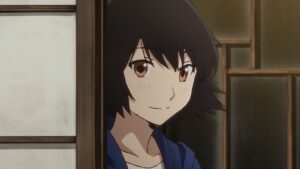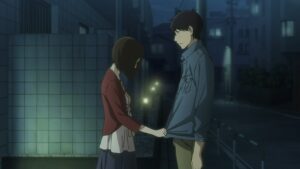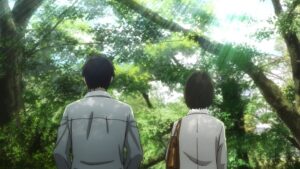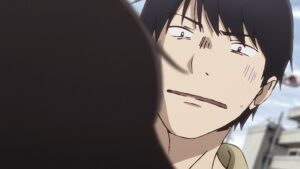You’ve already heard the news by now, I’m sure, but the idea of this series getting an 18-episode order was a faulty bit of reporting by The Internet’s Most Trusted Anime News Source. Those six phantom episodes, once thought to be full-length TV offerings, actually referred to the short webisodes that followed half of the show’s regular installments. The last of those webisodes is available here, but you’d be forgiven for regarding it as insufficient closure; I doubt there’s a universe where a two-minute animated postmortem could fix what went down in episode 12 of Yesterday wo Utatte. Even as somebody who fully expected a Rikuo/Haru endgame, the conclusion I saw last Saturday was pretty damaging to the show’s overall reputation. But the final episode shouldn’t bear all the blame here – 11’s handling of the Rikuo/Shinako relationship set the stage for its sequel’s failure. If you’re wondering how that could be, hit the jump to see what I mean.
Let’s talk for a moment about where episode 10 left us with regards to Rikuo and Shinako’s awkward courtship. She invited him up for coffee after their New Year’s shrine visit, and once the two of them were settled in her apartment, he gave her a prolonged, one-armed hug and offered to go home for the night, to which she agreed. Did that strike you as a sign that they’re “together” in any capacity? It certainly didn’t for me. The scene played like another false start – one that promised more to come, perhaps, but there was no signal that these two were a couple. And yet the first time we see them together in episode 11, they go grocery shopping together, casually chatting about their work schedules and what they’ll have for dinner as though they’ve been going out for months. They have, in fact – if the shrine visit happened on January 1st, and a new school year is about to begin for Shinako on April 7th, then they’ve had a quarter of a year to grow comfortable together. Trouble is, we don’t see what it took to reach that point.
Rikuo and Shinako share plenty of meals in the penultimate episode, but all of it takes place toward the tail end of their three month relationship. The grocery store scene feels so strange because it closely follows Rikuo’s sleepover at Haru’s apartment, which was itself a direct continuation of episode 10’s cliffhanger (the break-in). But given the easy manner with which our lovebirds scan the aisles for mackerel, its position at the start of episode 11 doesn’t track. From this point on, their scenes together carry the burden of a poorly-conveyed time skip. I know those additional six episodes were a mirage from the start, but if we’d had that kind of time, one of them could have been devoted to those three missing months. That would have effectively bridged the gap between “I’ll go home for tonight” and “What do you want for dinner tonight?”
While I’m on the subject of episode 11, I’d be remiss if I didn’t mention Shinako’s conversation with Morita-sensei over drinks. This was my favorite scene from this show’s final two weeks, because Morita is a straight talker in a series full of conversationally-deficient dummies. Shinako’s worries about her sexless relationship are met with a blunt, “If that’s going to make you feel guilty, you shouldn’t have gone out with him in the first place.” I was nodding my head at this sage piece of advice, when suddenly the follow-up came: “You don’t have to force yourself to do anything you don’t want to do.” Morita had just partially reinforced, then utterly BTFO’d the ‘hop in the sack’ argument from my previous post, all while speaking from a place of support and honesty. How can one girl be so best? I need a spinoff with Morita and Yuzuhara (the redhead from episode 6) as the main characters, so I can purge the taste of Utatte’s central plot from my tongue.
Anyway, Haru and Rou both find out about the Rikuo/Shinako relationship. Tears were shed, discomfort was felt, important scenes were shortchanged by the author of this blog post. Time to dump on the finale!
First gripe: in the wake of their crushed romantic dreams, we see Rou show up at his art school friend’s place, while Haru returns home to stay with her mom. These are great ideas, since they give both characters a chance to evolve away from their love interests. Does the show take advantage of their new living situations? No – it doesn’t have the time. Haru does spend an evening on the balcony of her mom’s apartment, ruminating on the nature of love and how she ought to define herself in its absence, but she’s given no time to explore her identity before Rikuo comes crawling back to her. All of her worrying and pining led to her desired relationship, rather than the realization that she ought to work on herself.
Second gripe: not enough time passes between the start of episode 12 (Rou’s confrontation) and the Rikuo/Shinako breakup scene around the 6 minute mark. The other two members of the love square have moved house by that point, which indicates at least a minor time skip. But when Shinako meets her boyfriend in the park, she says that she’s received her class assignment for the upcoming school year, which had nearly arrived by the end of episode 11. That means the events of the finale are pretty compact – which is where the lack of Rikuo/Shinako material from the previous week comes back to bite the show in the ass. As they sat on that park bench and sipped their canned coffee, talking wistfully about the time they spent together, I couldn’t help but think, “It sure would have been nice to witness any of that.”
Third gripe: Rikuo’s internal monologue during the bus ride to Haru’s hometown. Hopefully a commenter can supply me with an explanation for its cyclical, narcissistic nature, because I’m at a loss here. Rikuo was never a great character, given his poor communication skills and lack of ambition – the latter of which was merely slapped with a Band-Aid in the form of his meagerly-integrated photography job. But even if he wasn’t the world’s most interesting man, he was at least recognizably human. On the bus, though? He clutches at his chest, sweats visibly, and scares a young child with his strange behavior. He acknowledges the selfishness of his quest to win Haru’s love, and settles on, “So what if I’m selfish?” as his justification. Are you serious, my man? If you’re going to make the budget romcom move of taking a long bus ride to see a woman, shouldn’t it be because you love her, rather than because you want a girl on your arm? And for the love of Chiaki J. Konaka, how was he “doing the right thing” based on Haru’s opinion of his looks? Was that line a product of my imagination, trying and failing to salvage the scraps of Rikuo’s remaining dignity?
I’ve got more issues with the finale than I have space to list them, having passed the 1000 word mark a while ago. One of the biggest ones, which I assume is most people’s number one problem with the episode, is that Rikuo says “I’m in love with you” to Haru when there’s no evidence to support his confession. This rang false to me, too, and quite loudly. But I do want to defend Haru’s part in that last scene for a moment, since that seems to be my role among this show’s unofficial commentariat. Her reasons for liking the guy may have turned out to be pretty shallow, since the show never gave us any history beyond a couple of chance encounters on the street, but she handles herself really well during Rikuo’s weird venting session. When he says that any explanation of his situation would sound like an excuse, she responds: “So give me your excuse. I’ll listen.” All that time off camera must have given Haru the patience of ten women, because that’s a really mature turn of phrase to land on, given the circumstances.
TL;DR
– Rikuo is big dumb
– Shinako deserved better
– Haru was robbed
– Rou was also a character
– Morita-sensei spinoff WHEN?!
More formal, less whingy series review on Thursday.





Eh, maybe I’ll get the final review done tomorrow instead. ;/
I really liked this review. You did say everything and more I could have said about my impression of the finale. Think I am generally not a fan of the conflicts near the end of the series, mainly because of the lack of progress.
We had two characters who absolutely knew what they wanted and were sometimes annoying about it, and two characters who could absolutely not decide on anything. I get Shinako though, her past makes her understandable and it’s an intersting conflict. Though with her not moving on and Rikou going back and forth between two girls he could choose, incapable of ever reacting properly to the problems of others, the drama went on for too long.
I also feel that Rou was lowkey annoying for not being anything but a plot device to make Shinako second-guess everything she did. It didn’t help that he came off as spoiled kid demanding her attention and care non-stop and Rikou doing nothing about it.
Still like the series though, and I wish there were more dramas with more down-to-earth characters, especially adult ones like here.
Thanks for reading! I’d love to recommend more down-to-earth anime dramas with adult characters, but those are in short supply. Maybe try Natsuyuki Rendezvous? It has a supernatural element, but it’s decidedly on the mature side, and the art direction is gorgeous. Fune wo Amu (The Great Passage) only has a minor romantic element, but it has a working adult cast and a subdued atmosphere.
True Tears is also quite similar to Yesterday wo Utatte in its coming-of-age themes and love triangle setup, but it’s set in high school. Pretty good 2000s romance series, though it becomes quite dramatic near the end.